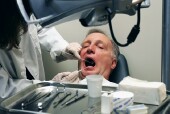- Double Mastectomy May Offer No Survival Benefit to Women With Breast Cancer
- Toxic Lead Found in Cinnamon Product, FDA Says
- Certain Abbott Blood Sugar Monitors May Give Incorrect Readings
- Athletes Can Expect High Ozone, Pollen Counts for Paris Olympics
- Fake Oxycontin Pills Widespread and Potentially Deadly: Report
- Shingles Vaccine Could Lower Dementia Risk
- Your Odds for Accidental Gun Death Rise Greatly in Certain States
- Kids From Poorer Families Less Likely to Survive Cancer
- Tough Workouts Won’t Trigger Cardiac Arrest in Folks With Long QT Syndrome
- At-Home Colon Cancer Test Can Save Lives
Brush Your Teeth, Help Save Your Heart?


MONDAY, Nov. 4Having healthy gums is good for your heart, a new study says.
Researchers found that as people’s gum health improved, the buildup of plaque in their arteries slowed. This narrowing of the arteries, called atherosclerosis, is a major risk factor for heart disease, stroke and death.
The study included 420 adults who underwent tests to assess their gum health and plaque buildup in their neck (carotid) arteries. Over a follow-up of roughly three years, improvements in gum health and a reduction in the proportion of bacteria linked with gum infection (periodontal disease) was associated with a slower rate of plaque accumulation in the neck arteries.
The findings were published online Oct. 28 in the Journal of the American Heart Association.
“These results are important because atherosclerosis progressed in parallel with both clinical periodontal disease and the bacterial profiles in the gums,” study lead author Dr. Moise Desvarieux, an associate professor of epidemiology at Columbia University’s Mailman School of Public Health, said in a university news release. “This is the most direct evidence yet that modifying the periodontal bacterial profile could play a role in preventing or slowing both diseases.”
Gum disease-related bacteria may contribute to atherosclerosis in a number of ways. For example, animal studies suggest that these bacteria may trigger inflammation associated with atherosclerosis.
“It is critical that we continue to follow these patients to see if the relationship between periodontal infections and atherosclerosis carries over to clinical events like heart attack and stroke, and test if modifying the periodontal flora will slow the progression of atherosclerosis,” Desvarieux said.
Regular visits to your dentist and daily dental care can reduce your risk of gum disease.
More information
The U.S. National Institutes of Health explains how to prevent gum disease.
Source: HealthDay
Copyright © 2024 HealthDay. All rights reserved.










